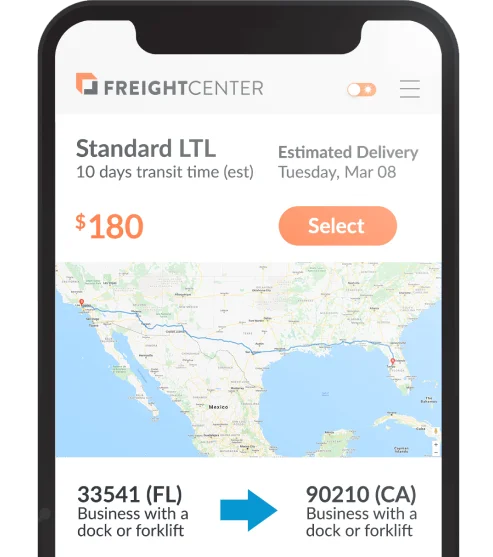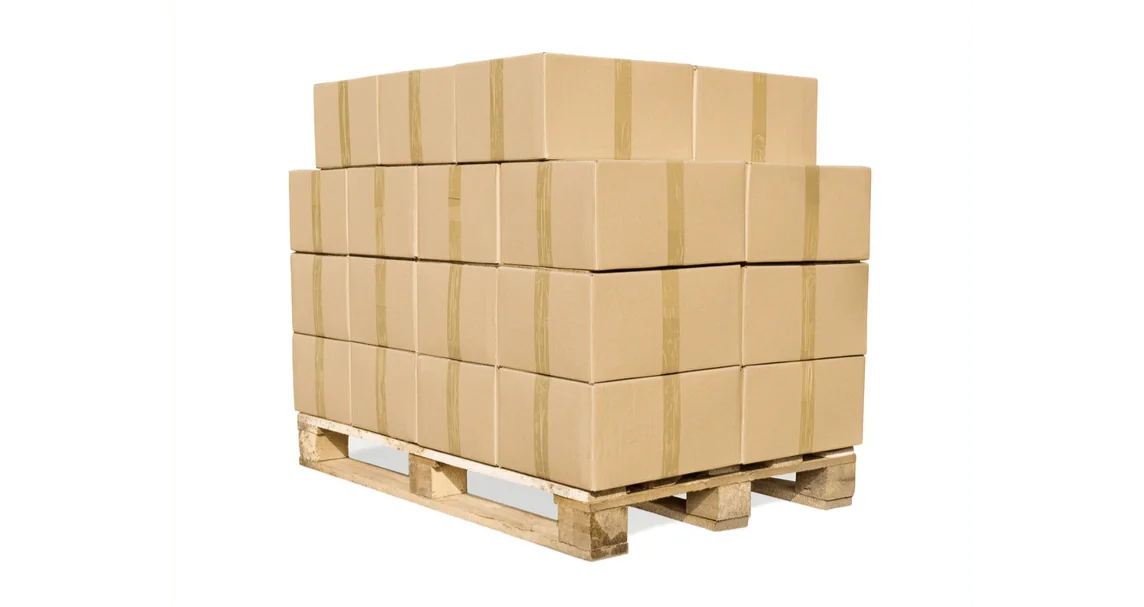
Black Friday Logistics 101
The shipping industry is always guaranteed to be kept on its toes when it comes to Black Friday Logistics.
With online sales volumes poised to increase this holiday season again, supply chains everywhere are preparing to deal with the challenging influx of customers and businesses. But how are companies impacted in how they set up their shipping departments during the busiest weekend in e-commerce? Here’s what you should know about Black Friday logistics to keep you and your shipping team on track.
Supply and Demand
It’s almost impossible for businesses to guarantee accurate inventory levels when it comes to freight shipping for Black Friday. The goal is always to have enough inventory supply to meet demand without needing to drastically reduce prices to liquidate the surplus of goods after promotions are over and demand spikes plateau or drop off.
Referring to historical sales data and factoring in trends helps supply chains better prepare for what to expect during the busiest shopping weekend in e-commerce. It also helps manage internal supply chain needs like packaging materials and offers insight into how the packaging process could be streamlined.
And with resources getting thrown into other things like marketing and promotions, a supply chain can only thrive within budget when there’s an accurate sales forecast.
Thousands of businesses trust FreightCenter to move their freight faster, smarter, and cheaper! From unbeatable rates to top-notch service, our customers are raving about their shipping success.
See why they keep coming back!
Award-Winning Service, Trusted by Shippers Everywhere!
- 2021, 2017 & 2016 Food Logistics’ Top Green Providers
- 2021 & 2018 Supply & Demand Chain Executives’ Pros to Know: Matthew Brosious
- 2020 & 2019 Top Food Logistics’ 3PL & Cold Storage Provider Award
- 2020 & 2019 Business Observer’s Top 500 Companies on the Gulf Coast
- 2020 & 2017 SmartWay® Transport Partner
- 2020 & 2017 Food Logistics’ Champions: Rock Stars of the Supply Chain
- 2020 Best of Palm Harbor Awards for Local Businesses
- 2017 Green Supply Chain Award from Supply & Demand Chain Executive
- 2017 Tampa Bay Business Journal Heroes at Work
- 2016, 2015, & 2012 Food Logistics Top 100 Software and Technology Providers
- 2013 Tampa Bay Business 100 by Tampa Bay Business Journal
- 2013 Top 100 Great Supply Chain Partners by SupplyChainBrain
- 2012 TIA Samaritan Award Honorable Mention
- 2012, 2011 & 2010 TBBJ Fast 50 Recipient
- 2013, 2011, & 2010 Diversity Business Top Businesses

Why Choose FreightCenter For Your Black Friday Logistics?
We are an award-winning logistics company and an American veteran-owned business. We bring a lot to the table when it comes to logistics services. Our history, competitive pricing, and level of service are unmatched in the industry. Over the years and many miles, we have formed a dedicated and respected network of partners in the industry to help customers meet deadlines.
Our mission is to meet and exceed customer expectations in all that we do. We take care of less-than-truckload freight shipping from pickup to delivery. Excellent customer service is our hallmark, and it goes a long way in building a relationship of trust. When customers select FreightCenter to handle their less-than-truckload freight shipment, they trust us to do the job.
Black Friday Inventory Management
Black Friday is one of the most significant shopping events of the year, and it places immense pressure on the logistics industry. This annual retail extravaganza, which typically falls on the day after Thanksgiving in the United States, has grown into a global phenomenon, with retailers and e-commerce companies offering massive discounts and deals to attract hordes of shoppers. As a result, the logistics and supply chain management surrounding Black Friday have become increasingly complex and critical.
Black Friday logistics revolve around the careful and strategic management of inventory, a pivotal aspect that can make or break the success of this shopping frenzy. As the countdown to Black Friday and its online counterpart, Cyber Monday, begins, retailers and e-commerce companies must embark on a meticulous process of inventory management.
The very essence of Black Friday hinges on the availability of enticing deals and discounts. Shoppers eagerly await the day to snatch up products at significant markdowns. To meet this enormous surge in demand, retailers need to ensure they have sufficient stock of popular products well in advance. This preparation begins months before the actual event.
Forecasting plays a critical role in this phase of Black Friday logistics. Retailers use historical data, market trends, and consumer behavior analysis to predict which items are likely to be the hot sellers. These forecasts are the foundation upon which inventory planning is built. Retailers need to know not only what will be popular but also in what quantities. Underestimating demand can result in stockouts, which lead to lost sales and disappointed customers. Conversely, overstocking can result in excess inventory that needs to be discounted or liquidated, eating into profit margins.
Demand planning is the next crucial step. Retailers must consider factors such as regional variations in demand, specific store preferences, and even the impact of global events that might influence product preferences. The goal is to create a demand plan that is as accurate as possible, minimizing the chances of under or overestimating demand. This step is closely tied to the marketing and promotional efforts, as the more accurately a retailer can gauge demand, the more precisely they can plan their promotions to align with it.
Inventory optimization is the final piece of the puzzle. It involves managing inventory levels to maximize profitability while minimizing carrying costs. It is here that technology and advanced analytics come into play. Retailers utilize inventory management systems that help them track stock levels in real-time, trigger reorders when necessary, and suggest efficient inventory allocation. Through these tools, retailers can fine-tune their inventory levels to meet demand without wasting valuable resources.
The culmination of this inventory management process is the well-stocked warehouses and distribution centers ready to fulfill orders swiftly. Retailers must ensure that their products are in the right place at the right time, whether they are shipping items to physical stores for in-person shoppers on Black Friday or directly to customers for online orders on Cyber Monday.
In essence, Black Friday logistics is a delicate balancing act, where inventory management serves as the linchpin. Retailers and e-commerce companies must adeptly use forecasting, demand planning, and inventory optimization to navigate the whirlwind of consumer demand and ensure that Black Friday and Cyber Monday are not only profitable but also deliver an outstanding shopping experience to customers. In this high-stakes retail game, the ability to meet and exceed customer expectations is ultimately what sets the winners apart from the rest.
Black Friday Warehousing
Warehousing is the backbone of Black Friday logistics, acting as the essential link between suppliers and consumers. With the tremendous surge in demand that Black Friday and Cyber Monday bring, the role of efficient and strategically positioned warehouses becomes paramount for retailers and e-commerce companies.
Warehouses are at the forefront of Black Friday logistics, as they are where the vast majority of inventory is stored, managed, and prepared for the shopping frenzy. These facilities need to be not only efficient but also highly organized to handle the substantial increase in stock and the meticulous coordination of inbound and outbound goods.
Efficiency in warehousing begins with optimal layout and organization. Products need to be readily accessible, and picking routes should be designed to minimize travel time for employees, especially during the peak shopping season. Additionally, advanced technologies such as barcode scanners, RFID systems, and automated picking solutions can significantly boost efficiency and accuracy in the warehouse, ensuring the right products are readily available for order fulfillment.
Well-stocked warehouses are critical to meeting the demands of Black Friday and Cyber Monday. Retailers cannot afford to run out of popular items during this high-stakes period, as it can lead to missed sales opportunities and disgruntled customers. To achieve this, a delicate balance must be struck between maintaining enough inventory to meet demand without overstocking, which can result in excess carrying costs and potential losses.
Many companies also resort to creative warehousing solutions during the holiday shopping season. Temporary or additional storage facilities, often located in strategic areas close to distribution centers, are utilized to accommodate the influx of inventory. These overflow facilities can help relieve the pressure on existing warehouses and ensure that products are readily available for order fulfillment.
The role of warehouses becomes even more prominent in the context of e-commerce. With the surge in online shopping during Black Friday and Cyber Monday, e-commerce retailers must ensure their warehouses are equipped to handle a high volume of orders, efficient packing and shipping, and timely delivery to customers. The layout of the warehouse and the management of goods are critical to streamline the e-commerce supply chain.
In summary, warehousing is a critical element of Black Friday logistics, ensuring that products are stored, organized, and dispatched to meet the skyrocketing demand. Efficient warehouse management, well-stocked inventories, and the utilization of additional storage facilities are pivotal in successfully navigating this annual shopping extravaganza. Ultimately, the effectiveness of these warehouse operations directly impacts a retailer’s ability to provide a seamless shopping experience and fulfill customer expectations during the Black Friday and Cyber Monday sales events.
To create value for our customers by delivering customized shipping solutions that meet their unique needs and to fulfill shipping demands from simple to complex with expertise, guidance and ingenuity.
Trust the experts at FreightCenter to give you the best prices and the most comprehensive options for all your LTL freight shipping needs.
We deliver optimized solutions for full or partial truckloads and competitive dry van, flatbed, and refrigerated freight pricing. We can cover your full truckload shipping needs.
Nationwide Expedited Trucking services move your freight securely and rapidly. Your freight requires fast delivery; our freight shipping experts can get your shipment fast, whether in one large box or a full truckload.
The most reliable Specialized Freight Services rates from all the top carriers are just a few steps away. From white glove service to international shipping, we've got you covered.


Black Friday vs. Cyber Monday
Black Friday:
- Traditionally falls on the Friday following Thanksgiving Day in the United States.
- Known for in-store shopping with significant discounts, doorbuster deals, and long lines.
- Historically, focused on brick-and-mortar retail, but has expanded to include online sales.
- Involves early morning store openings and limited-time, in-person sales events.
- Often associated with shopping in physical stores, although online shopping has gained prominence in recent years.
Cyber Monday:
- Takes place on the Monday following Thanksgiving weekend, emphasizing online shopping.
- Originated as an online counterpart to Black Friday, offering digital deals.
- Known for exclusive online discounts, free shipping offers, and digital promotions.
- Attracts shoppers looking for deals from the comfort of their homes or workplaces.
- Focuses on e-commerce, making it a digital-first shopping event.
- Popular for tech, electronics, and online retailers, but now encompasses a wide range of products and services.
FAQ
Q. What is reverse logistics in the context of Black Friday and Cyber Monday?
A. Reverse logistics refers to the processes involved in handling returns and exchanges of products that were purchased during Black Friday and Cyber Monday sales. It encompasses managing returned items, restocking, and maintaining a positive customer experience.
Q. Why is reverse logistics important during Black Friday and Cyber Monday?
A. Reverse logistics is crucial during these events because the surge in sales is accompanied by a significant increase in returns and exchanges. Managing these returns efficiently is essential to maintain customer satisfaction, optimize costs, and capitalize on the shopping momentum.
Q. What are some key challenges retailers face in managing reverse logistics during these sales events?
A. Retailers often face challenges in quickly restocking returned items, conducting quality control checks, managing return channels across various sales platforms, and ensuring transparent communication with customers. It can be a complex process given the volume of returns.
Q. How can technology assist in optimizing the reverse logistics process during Black Friday and Cyber Monday?
A. Technology, such as barcode scanning and automated returns systems, can expedite the returns process, accurately update inventory records, and facilitate the restocking of items. These tools enhance efficiency and help manage the high volume of returns.
Q. What role does sustainability play in reverse logistics during these shopping events?
A. Sustainability is becoming increasingly important. Retailers are looking to handle unsellable returned items in an environmentally responsible manner, which may include recycling, repurposing, or donating. This aligns with growing consumer expectations for eco-friendly practices.
FAQ
Q. What is reverse logistics in the context of Black Friday and Cyber Monday?
Reverse logistics refers to the processes involved in handling returns and exchanges of products that were purchased during Black Friday and Cyber Monday sales. It encompasses managing returned items, restocking, and maintaining a positive customer experience.
Q. Why is reverse logistics important during Black Friday and Cyber Monday?
Reverse logistics is crucial during these events because the surge in sales is accompanied by a significant increase in returns and exchanges. Managing these returns efficiently is essential to maintain customer satisfaction, optimize costs, and capitalize on the shopping momentum.
Q. What are some key challenges retailers face in managing reverse logistics during these sales events?
Retailers often face challenges in quickly restocking returned items, conducting quality control checks, managing return channels across various sales platforms, and ensuring transparent communication with customers. It can be a complex process given the volume of returns.
Q. How can technology assist in optimizing the reverse logistics process during Black Friday and Cyber Monday?
Technology, such as barcode scanning and automated returns systems, can expedite the returns process, accurately update inventory records, and facilitate the restocking of items. These tools enhance efficiency and help manage the high volume of returns.
Q. What role does sustainability play in reverse logistics during these shopping events?
Sustainability is becoming increasingly important. Retailers are looking to handle unsellable returned items in an environmentally responsible manner, which may include recycling, repurposing, or donating. This aligns with growing consumer expectations for eco-friendly practices.



